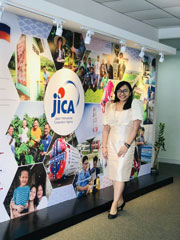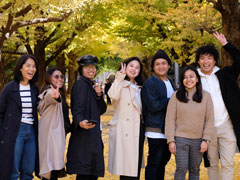
Name: Airish Jane Baquiran
Country of Origin: Philippines
Faculty and University: Graduate School of Public Policy,The University of Tokyo
JICA Course: SDGs Global Leader
Research Area/Theme: Policy development and administration
Ms. Airish Jane Baquiran, a JICA-DSP recipient, is currently pursuing a master's degree in Public Policy at the Graduate School of Public Policy, The University of Tokyo. She tells us about her work in the realm of social development specifically in the education and skills sector in the Philippines and her academic journey in Japan, and also shares her insights on gender diversity with respect to these experiences.
Prior to her master's degree in the University of Tokyo, Ms. Airish Jane Baquiran worked as an economic development specialist with the National Economic and Development Authority (NEDA) in the Philippines. Describing her job responsibilities, she says, "We evaluate projects under the education programs of the government. We monitor programs and provide analysis to the higher level of administration about the education sector." Previously, she was also engaged with the Department of Social Welfare and Development, which spurred her interest in this field of work. This also drove her decision of undertaking a master's program in Public Policy at the University of Tokyo, to understand the work at both national and international levels.
Ms. Baquiran thanks her fortune for not having experienced gender discrimination through her educational and career-oriented phases of life so far. However, she acknowledges that a disproportion exists in this regard in her home country, the Philippines. While men receive relatively better exposure to academics, it is not given as much importance for women. She hopes to empower the women of her country through education. "I am working to bring about a change through quality policies that will enable them to really have a conducive environment for education, especially in these really trying times," she says.

Good feedback about JICA-DSP from friends who had pursued graduate studies in Japan under this program provided the initial motivation to Ms. Baquiran for applying to the program. While her friends gave her information pertaining to international funding through the program, she gathered additional details about eligibility criteria involved by herself.
Aligning her interests, Ms. Baquiran decided to pursue research in the social development sector through JICA scholarship. Her objective when entering the program was to develop a strong foundation for herself in the field of public policy and equip herself with knowledge and skills with which she could help the people in her country, through policy development and administration. The program largely met her expectations academically and also provided her with an opportunity to know and understand Japan as a country, with all its cultural nuances.

The JICA-DSP and the University of Tokyo additionally provided Ms. Baquiran with networking opportunities through seminars and other activities, where she could interact with peers and discuss international opportunities. Ms. Baquiran tells us about the various global initiatives, professional discourses, and platforms developing in Brazil, France, and Canada, which she has been closely monitoring and is looking forward to eventually participate in. Through some networking seminars she also got a chance to meet other JICA scholars from the Philippines, whom she already knew from previous interactions. They were now able to share their experiences of leading international academic lives in various parts of the world.
Ms. Baquiran has already registered for various courses offered by JICA-DSP, which offer a wealth of information on Japan's modernization journey, and eagerly looks forward to participating in them next spring.
Ms. Baquiran's involvements during the JICA-DSP were at the intersection of the Japanese program and the other associated international initiatives. She points out that while the international aspects of the program maintained a good gender balance, the Japanese programs showed a preference toward male scholars in terms of representation.
When asked about how it has been to leave her home country and study abroad, Ms. Baquiran candidly points out, "It's an opportunity for us to really further our careers." She also expresses happiness and gratitude in finding a strong bonded community of Filipinos in Japan. She agrees that leaving home can be challenging in more than one way, but also remarks how refreshing it felt to embark on this new journey, especially after the COVID-19 pandemic.
The JICA program has helped shape her aspirations over the last few years and provided her with greater diversity, flexibility, and scope of opportunities than she would have found in her home country.
When asked about advice for future JICA scholars looking to apply to the program, Ms. Baquiran summarizes: "My three bits of advice for aspiring scholars are: One, have a mentor. Two, be intentional in your goals, whether they are personal, professional, or social. Three, get involved and use your learnings from this experience to give back to the community."
She emphasizes the importance of mentorship, which helped her choose her path and goals during the fellowship period.